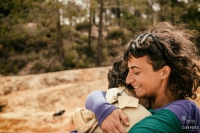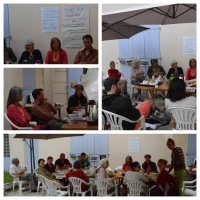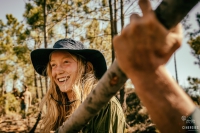Find your way
Follow us on Facebook

Follow us on Facebook

The success of the Tour strongly relies on the relevance and efficiency of the organization team. Each staff member has to demonstrate the right set of abilities to fulfil the specific role they will endorse during the Tour as well as a set of transversal skills, among which:
Each team has to find its own balance, but we recommend to list all the roles and responsibilities of each staff member in order to avoid misunderstandings and non-endorsed tasks and responsibilities.
There are plenty of tasks to complete before, during and after the Tour, hence we advice you to take into consideration at least the following roles:
For each of them, describe precisely what they mean, and list the tasks on a document that will be signed by both the coordinator and the person who will endorse the role. Be realistic when designing the roles and especially when endorsing one. You may want to challenge yourself, but if you get cocky and you overload yourself with responsibilities, you might break under the pressure and your whole team might have trouble recovering from it.
Few weeks before the Tour begins, gather the whole team for a simulation: read the program day by day and describe who does what and when, with as many details as you can. Try to anticipate problems and to figure out how you could navigate through them, as a team.
 During the Tour, take a moment at the end of each day for a staff meeting. Debrief about what happened during the day, prepare the following one, and build on the acquired knowledge to improve your action.
During the Tour, take a moment at the end of each day for a staff meeting. Debrief about what happened during the day, prepare the following one, and build on the acquired knowledge to improve your action.
Act and react as a team, and never forget this basic rule: Whatever happen, if the wrong information has been spread by one of your teammate (and if this information does not put anybody in danger) don't conflict with it ; follow it. You will have the opportunity to discuss about it later, during your next team meeting. For now, your role is to support the participants and your teammates in their attempts to follow the course and to make sure the day goes on smoothly.
A Heterotopia Tour usually involves many partners at a local level:
These local partners should contribute to a minimum of 1 out the 5 following tasks:
The quality of your partnership will strongly impact the quality of the Tour itself. Therefore, take some time to discuss with each possible partner about what your respective objectives and motivations are.
A specific attention should be paid to the partners that will host the group on their land for a week or a few days.
 We recommend that you contact them before making the temporary program of your stay during the Tour. Explain all aspects of the Tour (topics addressed, learning process, target group, etc ) and brainstorm on possible trainings and/or interactions. You should make your best to earn their trust if you don't know them already: for example by inviting them to visit your site/blog, or to get to know the place you work in and your colleagues. Introduce them to the activities and the topics your organization is into. This may take more time than expected, but don't lose faith.
We recommend that you contact them before making the temporary program of your stay during the Tour. Explain all aspects of the Tour (topics addressed, learning process, target group, etc ) and brainstorm on possible trainings and/or interactions. You should make your best to earn their trust if you don't know them already: for example by inviting them to visit your site/blog, or to get to know the place you work in and your colleagues. Introduce them to the activities and the topics your organization is into. This may take more time than expected, but don't lose faith.
If it clicks between you and a potential partner, visit their place to discuss the project in person, at least 4-5 months before the Tour takes place. You must figure out together how long your stay here should be so the participants can get acquainted with the project and understand its purpose and take part in the activities that will be held. Ask what living conditions they want to offer your group (access to water, size of the camping area), define what equipment you need and the results that are expected to come up, find out if some people from the hosting project can speak some English so they can interact with the group (in case the Tour involves people from different countries). Stay in regular contact and get into more details each time you meet. This will enable your final program to include several venues and your experience to be a nice blend of what the area has to offer.
Keep in mind that a good partnership should both rely on shared values and interests and on complementary resources, skills and experiences and that there should be no taboos in your discussion. Address all topics and not only the “fancy ones”. Talk about money, question the enthusiasm and expectations of the host from different perspectives, try to expose what is not-said, hidden or unconscious bias: whatever remains unspoken could become a fertile ground for misunderstandings or frustrations later on.
At any point in the discussion, if you believe that in the end the partnership is not relevant or if something troubles you, don't give up! Explore other options, among the same or a similar group of locals, ask your network and investigate as much as needed.
For sure it will be a long process! You might need several meetings in situ (at least 2) to understand each other and eventually reach the moment when you will sign a bilateral convention on which you will write down all information that matters: objectives, duration of your stay, contents of the work sessions, equipment provided, financial agreements, etc. Be clear and assertive: this document will be your final agreement and will allow you to avoid misunderstandings or easily solve problems during the implementation stage.
Apply more or less the same procedure for external trainers. Tackle all subjects related to your cooperation and write down what you agreed upon on an a formal document, it can be a contract.
The most important topic to address is their technical expertise or academic knowledge on the subject you would like them to introduce the participants to, but do not forget to take also into consideration:
Within 2 months before the Tour takes place, ask each trainer for a detailed description of their session from a logistical and a pedagogical point of views, so that you can prepare accordingly (space, material, etc.).
The cost of a Heterotopia Tour depends on several variables:
You have to consider all those to define your budget estimate and decide what you can afford and what you cannot. You will most probably have to rule some options out but it is part of the game. Now is the time to set your priorities: whether something is necessary, important or accessory.
So far in our case, most of the money needed to organize the Tour comes from public grants, and more specifically from the Erasmus+ Programme (Youth sector) but this is one way you can do it.
On the French side, we used to ask for a participation from the French participants to cover part of the costs of the support we provide them before and after the Tour but not all organizations proceed that way. Each organization should make their own choices according to their own ethics and special needs (paid staff, equipment, agreements with local partners…).
Whatever the choice you make, we believe the financial participation you ask the participants for should never prevent people to join. The Heterotopia Tour should be available to anybody, no matter their financial capacity.
You can then imagine several ways for people to contribute in a less or non-monetary way, such as:
The more diversified the sources of money you get, the better. Don't stay stuck with only one fund provider (for example the European program Erasmus+); you may also ask for support from your town, the province or any other public or private entity that you believe matches your ethics.
Good planning should help you reduce your expenses for most of the items.
 For example, regarding food, you can save money by buying important quantities from one supplier (an organic shop, a local cooperative, an organic farmer). From our experience, the best way is to buy the dry supplies from the city you are based in a organic shop beforehand. Throughout the Tour, look for fresh food (vegetables, fruits, cheeses, bread, etc.) produced by growers in the locations that the Tour is held.
It is to be expected that, if you call the suppliers in advance and let them now the quantities you will need, you will get a better deal than what you may find in the shops. This way you will know in advance the exact prices, and adapt your plan accordingly.
For example, regarding food, you can save money by buying important quantities from one supplier (an organic shop, a local cooperative, an organic farmer). From our experience, the best way is to buy the dry supplies from the city you are based in a organic shop beforehand. Throughout the Tour, look for fresh food (vegetables, fruits, cheeses, bread, etc.) produced by growers in the locations that the Tour is held.
It is to be expected that, if you call the suppliers in advance and let them now the quantities you will need, you will get a better deal than what you may find in the shops. This way you will know in advance the exact prices, and adapt your plan accordingly.
Regarding transportation (that might represent an important expense as the Heterotopia Tour usually takes place in rural areas devoid of public transportation) you can also reduce costs by optimizing each journey.
For each expense item, look for good deals and creative ways to answer your needs. If you do it correctly, you should save a lot of time, energy and money.
Last but not least: always consider your needs in terms of resources and not only in terms of money.
You might find ways to access what you need without spending money by offering something else to the provider of the good or service.
For example you can :
 Be creative, think out of the box: you might find a solution to most of the issues you are facing. And if you don't, just reconsider your need and look for another way: another activity that can meet the same objective, another technical or logistical arrangement…
Be creative, think out of the box: you might find a solution to most of the issues you are facing. And if you don't, just reconsider your need and look for another way: another activity that can meet the same objective, another technical or logistical arrangement…
When a door closes, it is not the end of the world, just a mosquito in your tent…
